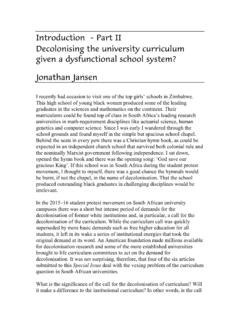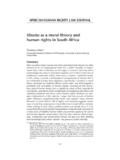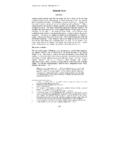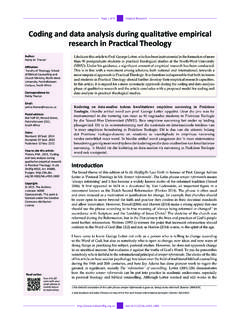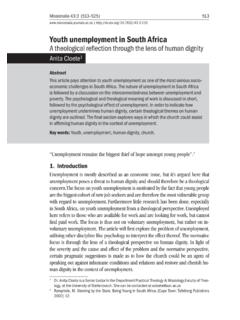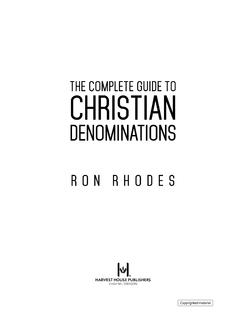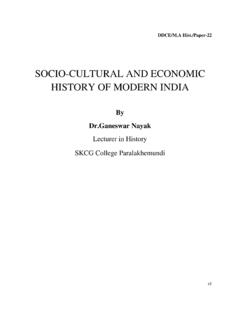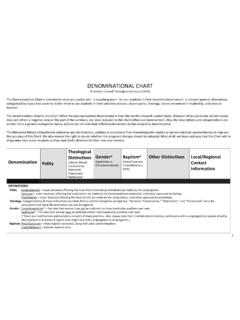Transcription of Contribution of John S Mbiti to the study of ... - SciELO
1 Stellenbosch Theological Journal 2019, Vol 5, No 3, 421 442. DOI: Online ISSN 2413-9467 | Print ISSN 2413-9459. 2019 Pieter de Waal Neethling Trust Contribution of John S Mbiti to the study of African religions and African theology and philosophy Mbaya, Henri Stellenbosch University, Stellenbosch, South Africa Cezula, Ntozakhe Stellenbosch University, Stellenbosch, South Africa Abstract This paper discusses the Contribution of Professor John S Mbiti to African theology and African Philosophy. It does this by highlighting several scholars in various contexts who have attempted to highlight his Contribution to these fields of study . The paper highlights some important concepts and issues that Mbiti has dealt with in his theological and philosophical works. The overall argument of these authors is that Mbiti has argued that in their cultures and religions, Africans do know and experience God.
2 Keywords African; Contribution ; culture; Mbiti ; philosophy; religion; theology 1. Introduction The place of Professor John S Mbiti in African theology and African Philosophy is undoubtedly colossal. As it will soon be evident in this paper, several scholars in various contexts have attempted to highlight his Contribution to these fields of study . Certainly, this paper does not pretend to exhaust this topic within a short space of time. It only seeks to make a small Contribution to the current debate. The objective of this paper is to highlight some important concepts and issues that Mbiti has dealt with in his theological and philosophical works. The paper will attempt to do this through the scholars and our own critical commentary on some of his work. 422 Mbaya & Cezula STJ 2019, Vol 5, No 3, 421 442.
3 Having highlighted very briefly the colonial context, we will proceed to deal with the issue under study under the following themes: the Question of African Religions, an African Consciousness in Mbiti , Mbiti 's call for serious engagement with the African Context, Mbiti 's Stimulation of Academic debate in the study of African Traditional Religions (ATR), his methodological Approach in ATR, Mbiti 's concept of An African Ontology, Mbiti 's concept of African Ethics and Justice, Mbiti 's Contribution to Traditional African Spirituality, Mbiti 's Concept of Individual immortality, and of course Mbiti 's Concept of Time and African beliefs, and Mbiti 's Contribution to Biblical translations. 2. Colonial context in Africa: 1960 70s An African identity crisis In his Theology and Identity, Kwame Bediako critically highlighted the dilemma that faced an African in the 1950s and 1960s.
4 He stressed that it was a dilemma that an African faced that was intertwined with the issue of the quest of identity. He put it thus: It is unfortunate that the quest for an African Christian identity in terms of which are meaningful to African integrity and also adequate for Christian confession, should become so pervasively bedevilled by the missionary enterprise that was instrumental in bringing African Christianity into being, no less than by consequences of the melancholy history of African contact with the Christian peoples of Europe. 1. Mbiti himself articulated the problem as follows: Even though attempts are made to give Christianity an African character, its Western form is in many ways foreign to African peoples. This foreignness is a drawback because it means that Christianity is kept on the surface and is not free to deepen its influence in all areas of African life and problems.
5 2. 1 Kwame Bediako, Theology and African Identity (Regnum, 1992), 252. 2 John S. Mbiti , Introduction to African Religion (London: Heinemann, 1975), 185. Mbaya & Cezula STJ 2019, Vol 5, No 3, 421 442 423. Implicit in the issue lay a more critical one, that of identity, specifically with regard to being African and Black in an era where Blackness and Africanness seemed affronted. The issue of African identity came to the fore in a more compelling manner: Is it possible to be an African and yet ascribe to Western Christianity? Is my African culture a hindrance to practicing Western Christianity? John Gatu viewed the incongruity between missionary Christianity and an emerging African Christianity to be of such magnitude that he in 1972 stated, the time has come for the withdrawal of foreign missionaries from many parts of the Third World, that the Churches of the Third World must be allowed to find their own identity, and that the continuation of the present missionary movement is a hindrance to the selfhood of the The context of this is the socio-economic and political upheavals in Africa.
6 In the 1970s, East Africa, like other regions on the continent, were going through a socio-economic and political upheaval. Kenya, Mbiti 's country of birth, in East Africa, was caught up in the euphoria of uhuru and harambee, so was Tanzania, with ujamaa, a socio-economic and political ideology of Mwalimu Julius Nyerere. 3. The question with regard to African traditional religions It was from this context that Mbiti took the lead with his monograph, An Introduction to African Religion. The Church Times hailed it as ground- breaking a work of scholarship which breaks new and intriguing ground. 4 The Church Times went on to assert that in this work [ Mbiti ]. shows how, behind many simple expression of belief, there often lies a profound faith in God as Father and Creator 5 On the whole, Mbiti demonstrated that indeed Africans had not only possessed an organised religion but also had a notion of the Supreme Being.
7 3 See [Online]. [Accessed: 6 May 2019]. 4 Mbiti , Introduction to African Religion (back cover). 5 Mbiti , Introduction to African Religion (back cover). 424 Mbaya & Cezula STJ 2019, Vol 5, No 3, 421 442. Jan Nieder-Heitmann noted that Mbiti made that assertion against the background of some European anthropologists, sociologist and even missionaries that Africans possessed no religion. Among these categories of professionals there were those who discounted African Traditional Religions as animism, fetishism, magic, polytheism, idolatry, According to Nieder-Heitmann, not only did Mbiti argue for the notion of the Supreme Being in ATR, but he went a step further, that Africans have the notion of a Personal God, who is known and worshipped under various names, which indicate his attributes7.
8 This God is approached through not only ancestral mediations but also directly through More critical, however, Nieder-Heitmann noted that, in response to the argument by some Western scholars that God in Africa is viewed or experienced as remote, Mbiti , and the Yoruba scholar, Bolaji Idowu, stressed His importance in African cosmology, ritual and ethics. 9. Thus Nieder-Heitmann argued that Mbiti not only oppose[d] the view of Western scholars, but he mastery succeed[ed] in resolving the paradoxical conceptualisation of a God at once distant (transcendent) and intervening and involved in the affairs of men (immanent). God is thus both far and near for many Africans. 10. For Mbiti , according to Nieder-Heitmann, Religion is to the Africans an ontological phenomenon which pertains to the question of existence or being.
9 For him, therefore, and for the larger community of which he is part, to live is to be caught up in a religious drama. This is fundamental, for it means that man lives in a religious universe. 11 Africans have their own ontology, but it is a religious ontology, and to understand their religions we must penetrate it. 12. 6 J. H. Nieder-Heitmann, An Analysis and Evaluation of John S. Mbiti 's Theological Evaluation of African Traditional Religion, MTh. (Missiology), University of Stellenbosch, 1981, 68. 7 Ibid., 68 72. 8 Ibid., 69. 9 Ibid., 69. 10 Ibid., 70. 11 Ibid., 13. 12 Ibid., 13. Mbaya & Cezula STJ 2019, Vol 5, No 3, 421 442 425. 4. An African consciousness in Mbiti Kwame Bediako asserts that, in giving an in-depth exposition of the ATR. and cultures, Mbiti seeks to show that historically, Christianity is very much an African religion.
10 13 He asserts that Mbiti stresses the homeliness . of Christianity in Africa comparing it to Ancient Christianity in Africa. He urges that Christianity is not foreign to the African soil. Then he substantiates this argument by citing many martyrs on the continent who voluntarily sacrificed for their Hence, Bediako conclude Mbiti 's case for an African theology, therefore, came to rest not on negative, polemical grounds, but on a positive view of the Gospel as being genuinely at home in Africa. 15. Then the big question arises: Is African traditional religion praeparatio evangelica? To what extent does ATR contain elements that can be affirmed as Christian or be considered as a bridge with Christianity? This raises the question of the theology of religions, namely how to define the relationship between ATR and the Christian religion.
